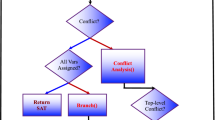Abstract
The goal of knowledge compilation is to enable fast queries. Prior approaches had the goal of small (i.e., polynomial in the size of the initial knowledge bases) compiled knowledge bases. Typically, query–response time is linear, so that the efficiency of querying the compiled knowledge base depends on its size. In this paper, a target for knowledge compilation called the ri-trie is introduced; it has the property that even if the knowledge bases are large, they nevertheless admit fast queries. Specifically, a query can be processed in time linear in the size of the query regardless of the size of the compiled knowledge base.
Similar content being viewed by others
References
Bryant, R.E.: Symbolic boolean manipulation with ordered binary decision diagrams. ACM Comput. Surv. 24(3), 293–318 (1992)
Cadoli, M., Donini, F.M.: A survey on knowledge compilation. AI Commun. 10, 137–150 (1997)
Coudert, O., Madre, J.: Implicit and incremental computation of primes and essential implicant primes of boolean functions. In: Proceedings of the 29th ACM/IEEE Design Automation Conference, pp. 36–39. (1992)
Darwiche, A.: Compiling devices: a structure-based approach. In: Proceedings, International Conference on Principles of Knowledge Representation and Reasoning (KR98), pp. 156–166. Morgan-Kaufmann, San Francisco, CA (1998)
Darwiche, A.: Decomposable negation normal form. J. Assoc. Comput. Mach. 48(4), 608–647 (2001)
de Kleer, J.: An improved incremental algorithm for computing prime implicants. In: Proceedings of AAAI-92, pp. 780–785. San Jose, CA (1992)
Forbus, K.D., de Kleer, J.: Building Problem Solvers. MIT, Cambridge, MA (1993)
Hai, L., Jigui, S.: Knowledge compilation using the extension rule. J. Autom. Reason. 32(2), 93–102 (2004)
Hähnle, R., Murray, N.V., Rosenthal, E.: Normal forms for knowledge dompilation. In: Ras, Z. (ed.) Proceedings of the International Symposium on Methodologies for Intelligent Systems, (ISMIS ‘05), In: Lecture Notes in Artificial Intelligence, vol. 3488, pp. 304–313. Springer, Berlin Heidelberg New York (2005)
Jackson, P., Pais, J.: Computing prime implicants. In: Proceedings of the 10th International Conference on Automated Deductions, Kaiserslautern, Germany, July 1990. Lecture Notes in Artificial Intelligence, vol. 449, pp. 543–557. Springer, Berlin Heidelberg New York (1990)
Jackson, P.: Computing prime implicants incrementally. In: Proceedings of the 11th International Conference on Automated Deduction, Saratoga Springs, NY, June 1992. Lecture Notes in Artificial Intelligence, vol. 607, pp. 253–267. Springer, Berlin Heidelberg New York (1992)
Kautz, H., Selman, B.: A general framework for knowledge compilation. In: Proceedings of the International Workshop on Processing Declarative Knowledge (PDK). Kaiserslautern, Germany (1991)
Kean, A., Tsiknis, G.: An incremental method for generating prime implicants/implicates. J. Symb. Comput. 9, 185–206 (1990)
Kean, A., Tsiknis, G.: Assumption based reasoning and clause management systems. Comput. Intell. 8(1), 1–24 (1992)
Marquis, P.: Knowledge compilation using theory prime implicates. In: Proceedings of the International Joint Conference on Artificial Intelligence (IJCAI), pp. 837–843. Morgan-Kaufmann, San Mateo, CA (1995)
Morrison, D.R.: PATRICIA – practical algorithm to retrieve information coded in alphanumeric. J. Assoc. Comput. Mach. 15(4), 514–34 (1968)
Murray, N.V., Rosenthal, E.: Dissolution: making paths vanish. J. Assoc. Comput. Mach. 40(3), 504–535 (1993)
Murray, N.V., Rosenthal, E.: Duality in knowledge compilation techniques. In: Ras, Z. (ed.) Proceedings of the International Symposium on Methodologies for Intelligent Systems (ISMIS ‘05). Lecture Notes in Artificial Intelligence, vol. 3488, pp. 182–190. Springer, Berlin Heidelberg New York (2005)
Murray, N.V., Rosenthal, E.: Efficient query processing with compiled knowledge bases. In: Proceedings of the International Conference TABLEAUX 2005 – Analytic Tableaux and Related Methods, Koblenz, Germany, September 2005. Lecture Notes in Artificial Intelligence, vol. 3702, pp. 231–244. Springer, Berlin Heidelberg New York (2005)
Murray, N.V., Rosenthal, E.: Tableaux, path dissolution, and decomposable negation normal form for knowledge compilation. In: Proceedings of the International Conference TABLEAUX 2003 – Analytic Tableaux and Related Methods, Rome, Italy, September 2003. Lecture Notes in Artificial Intelligence, vol. 2796, pp. 165–180. Springer, Berlin Heidelberg New York (2003)
Ngair, T.: A new algorithm for incremental prime implicate generation. In: Proceedings of IJCAI-93. Chambery, France (1993)
Przymusinski, T.C.: An algorithm to compute circumscription. Artif. Intell. 38, 49–73 (1989)
Ramesh, A., Becker, G., Murray, N.V.: CNF and DNF considered harmful for computing prime implicants/implicates. J. Autom. Reason. 18(3), 337–356 (1997) (Kluwer)
Ramesh, A., Murray, N.V.: An application of non-clausal deduction in diagnosis. Expert Syst. Appl. 12(1), 119–126 (1997)
Reiter, R.: A theory of diagnosis from first principles. Artif. Intell. 32, 57–95 (1987)
Selman, B., Kautz, H.: Knowledge compilation and theory approximation. J. Assoc. Comput. Mach. 43(2), 193–224 (1996)
Slagle, J.R., Chang, C.L., Lee, R.C.T.: A new algorithm for generating prime implicants. IEEE Trans. Comput. C-19(4), 304–310 (1970)
Strzemecki, T.: Polynomial-time algorithm for generation of prime implicants. J. Complex. 8, 37–63 (1992)
Author information
Authors and Affiliations
Corresponding author
Rights and permissions
About this article
Cite this article
Murray, N.V., Rosenthal, E. Efficient Query Processing with Reduced Implicate Tries. J Autom Reasoning 38, 155–172 (2007). https://doi.org/10.1007/s10817-006-9054-x
Accepted:
Published:
Issue Date:
DOI: https://doi.org/10.1007/s10817-006-9054-x




